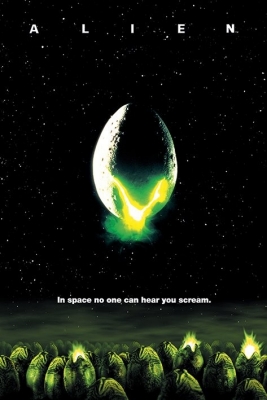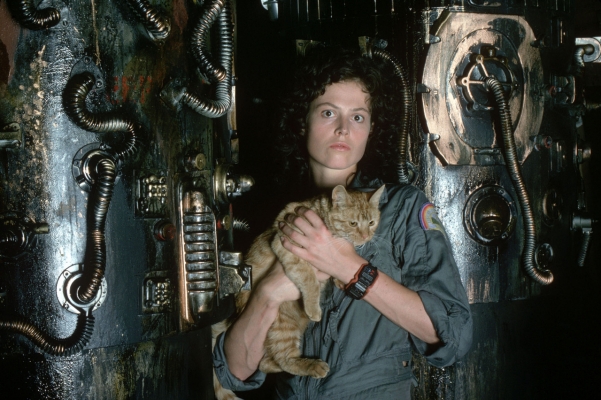The Golden Age of Science Fiction: Alien
The Best Dramatic Presentation category was not one of the original Hugo categories in 1953, but was introduced in 1958, when it was won by The Incredible Shrinking Man. No Award won in 1959 followed by three years of The Twilight Zone and another No Award. The Award, called variously Best Dramatic Presentation and Best SF or Fantasy Movie, was given out annually from 1958 through 2002 when it was split into two categories, one for Short Form and one for Long Form. In 1980, the Hugo Award was presented at Noreascon Two in Boston, Massachusetts on August 31.
In 1972, the British Fantasy Society began giving out the August Derleth Fantasy Awards for best novel as voted on by their members. In 1976 the name was changed to the British Fantasy Award, although the August Derleth name was still the name for the Best Novel Award. A category for Best Film was created in 1973 and ran years until 1990 and has not been replaced. In 1980, the awards were presented at Fantasycon VI in Birmingham.
Stanley Kubrick’s 2001: A Space Odyssey was released in 1968. Eleven years later, Ridley Scott released Alien. Although one is generally thought of as a spiritual science fiction film and the other is a science fiction horror film, there are similarities between the two.
Only looking at the second section of 2001, “Jupiter Mission,” Kubrick has created a tribute to the tedium of space. Frank Poole and David Bowman are moving at incredible speeds through interplanetary space on their way to Jupiter while Hunter, Whitehead, and Kaminsky are in cryosleep. Eventually a malevolent entity, the HAL 9000, makes its presence on the ship known, killing off the crew and eventually being dispatched by the only surviving crew member, David Bowman.
Scott opens Alien with lingering shots of the apparently empty Nostromo as it flies through interstellar space, including shots showing the empty corridors of the ship as the crew is in cryosleep. They slowly wake and go about their activities, again demonstrating the tedium of spaceflight. Eventually a malevolent entity, the titular alien, who was not called a xenomorph until the second film, makes its presence on the ship known, killing off the crew and eventually being dispatched by the only surviving crew member, (Ellen) Ripley.
And yet the feeling of the two films is completely at odds with each other. In 2001, Bowman and Poole chalk up the deaths of their colleagues as a technological glitch and Poole’s own death isn’t anticipated by Poole or Bowman in a way to elicit terror. Scott introduces a clearly alien horror on the Nostromo and focuses his attention on the way the crew members deal with their own fears and anxieties in confronting the creature and their own mortality in a way that just doesn’t exist in 2001. While Kubrick was intent on building an intellectual tension, Scott was building a more visceral tension based on the survival of the crew and, like Steven Spielberg with Jaws four years earlier, Scott only hints at the form of his alien for the majority of the film. The unknown is more fearful than the known. Even when showing the “Facehugger” and “Chestburster” form of the alien, it was clear that the creature would morph into something larger and more deadly. Seeing those immature forms of the final alien only helps to build the tension as to what form the alien would eventually take. The violent deadliness of the young alien form on Kane also helps to create the expectation that if not killed before it is fully mature, the alien will be able to eradicate the crew of Nostromo and, potentially, the Earth.
Scott created a very successful film that appealed to both science fiction fans and horror film fans, essentially a haunted house film set in space, which raised the stakes since the inhabitants couldn’t simply leave the house but were trapped with the monster. The film also launched a franchise that ran for four films, a crossover series that paired it with the Predator franchise, and the film Prometheus, set in the same universe.
Alien bested a Hugo field that included The Black Hole, The Muppet Movie, Star Trek: The Motion Picture, and Time After Time. Interestingly, it was the only one of those films which was nominated that year for the British Fantasy Film Award, along with Ralph Bakshi’s The Lord of the Rings and George A. Romero’s Zombies: Dawn of the Dead.
 Steven H Silver is a sixteen-time Hugo Award nominee and was the publisher of the Hugo-nominated fanzine Argentus as well as the editor and publisher of ISFiC Press for 8 years. He has also edited books for DAW and NESFA Press. He began publishing short fiction in 2008 and his most recently published story is “Webinar: Web Sites” in The Tangled Web. Steven has chaired the first Midwest Construction, Windycon three times, and the SFWA Nebula Conference 6 times, as well as serving as the Event Coordinator for SFWA. He was programming chair for Chicon 2000 and Vice Chair of Chicon 7.
Steven H Silver is a sixteen-time Hugo Award nominee and was the publisher of the Hugo-nominated fanzine Argentus as well as the editor and publisher of ISFiC Press for 8 years. He has also edited books for DAW and NESFA Press. He began publishing short fiction in 2008 and his most recently published story is “Webinar: Web Sites” in The Tangled Web. Steven has chaired the first Midwest Construction, Windycon three times, and the SFWA Nebula Conference 6 times, as well as serving as the Event Coordinator for SFWA. He was programming chair for Chicon 2000 and Vice Chair of Chicon 7.


That’s a fine list of Hugo nominees, and I’d agree that Alien deserves the top spot.
To repeat what I said on Facebook: There’s no way in heck that I would’ve been allowed to see the movie in theaters when it came out in 1979, so I had to content myself with repeatedly reading the Alan Dean Foster novelization until I finally saw the movie on VHS sometime in the mid-1980s. It would have been a bit of an odd viewing experience just because, having read the book so often, I already knew most of the major story beats and wouldn’t have been surprised by the Chestburster, Ash’s turn, etc. And even by the mid-80s, the pacing would have been what I could only describe as deliberate. But it’s still a remarkable movie that I need to revisit from time to time.
Like Joe, I’d read the Alan Dean Foster novelisation beforehand, and got to see the movie a few months later while on holidays in a small seaside town in southern Ireland (despite being underage). And like Joe, this meant I knew every twist and turn. Still a worthwhile experience!
You make a very interesting point about the similarities between the two movies – and although I realise you only mentioned these in order to stress the differences, I think we can deduce another similarity.
You say that eventually a malevolent entity makes its presence known. What’s interesting is that in both cases, that malevolent entity gets on board by infecting a crew member – the ship’s AI in ‘2001’ and Kane in ‘Alien’.